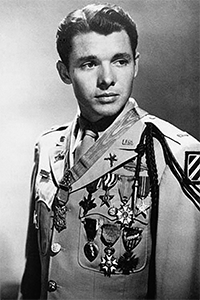He was an unlikely hero. Born into a life of crushing poverty in Texas, Audie Murphy was so scrawny when he tried to enlist after Pearl Harbor that the Marine Corps and the paratroopers wouldn’t take him. He joined the infantry. Even there, his officers suggested he accept a non-combat role. Instead, Murphy became a front-line warrior, fighting his way through Sicily, up the boot of Italy, and into France and Germany. He is one of history’s most decorated combat veterans. Through it all, he felt the same sense of “weary indifference” he experienced when he killed his first enemy soldiers in Sicily. Nor he wasn’t fearless. On the battlefield, “fear is right there beside you,” he wrote.
Murphy was an everyman who found and lost himself in war. His Medal of Honor citation praised his “indomitable courage,” but he paid a heavy price for his heroism. Even after he became a movie star, Murphy fought demons war had created within him.
“Before the war, I’d get excited and enthused about a lot of things,” he told John Huston, who directed him in “The Red Badge of Courage,” “but not anymore.” He suffered from nightmares, slept with a gun under his pillow and gambled recklessly. He titled his autobiography “To Hell and Back,” but it seems a part of Murphy never returned from the hell of combat. Such are the sacrifices heroes make.
– Tom Huntington, contributing editor to America in WWII magazine and author of “Searching for George Gordon Meade: The Forgotten Victor of Gettysburg”


